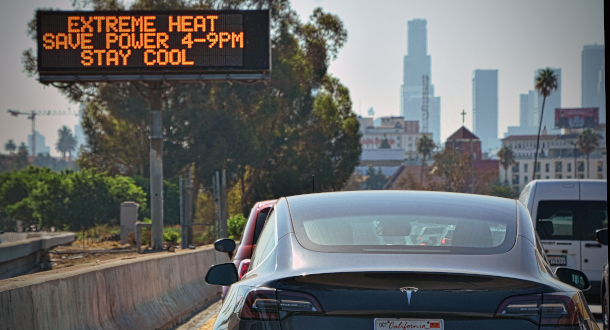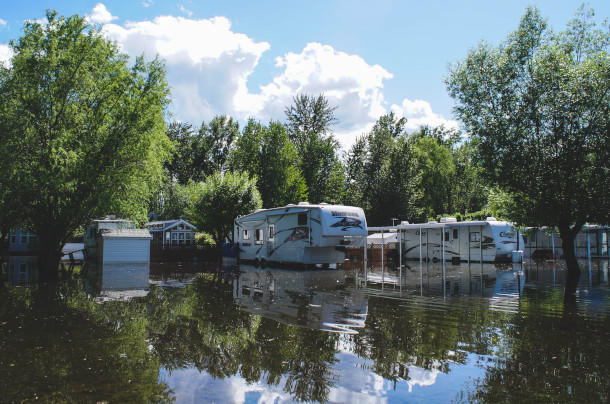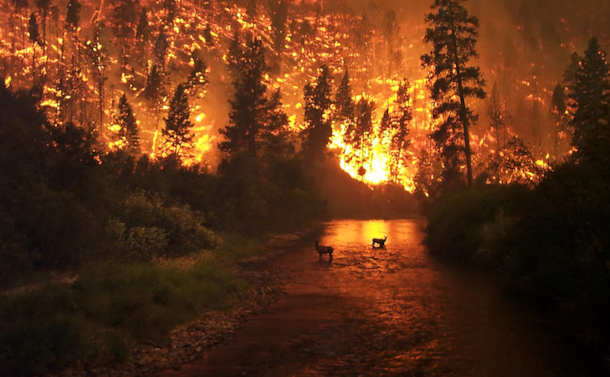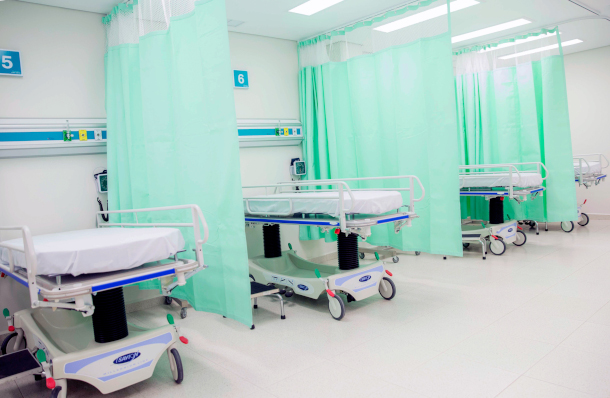Climate Change and Your Health
Air Date: Week of December 2, 2022

Extreme heat, which will become more common in the future, exacerbates existing health conditions, from kidney disease to mental illness. (Photo: Chris Yarzab, Flickr, CC BY 2.0)
Extreme heat, severe storms, and wildfires are just a few of the impacts of climate change that can harm people, from cardiovascular disease to mental illness. So, healthcare advocates like Dr. Kimberly Humphrey, an emergency physician from Australia and a fellow at Harvard’s Center for Climate, Health, and the Global Environment, are calling for a drastic reduction in fossil fuel use to avoid the worst of the climate crisis. She joins Host Bobby Bascomb to discuss how healthcare can prepare for a climate-changed future and why recent commitments promised at the COP27 climate talks fall short of what’s needed to keep people safe.
Transcript
CURWOOD: It’s Living on Earth, I’m Steve Curwood.
BASCOMB: And I’m Bobby Bascomb
Climate disruption poses serious threats to our health. Extreme heat, severe storms, and wildfires are just a few of the impacts of climate change that can harm people, from cardiovascular disease to mental illness. And these challenges are pushing healthcare systems across the world to their limits. In response, a global community of healthcare professionals is calling for a drastic reduction in fossil fuel use to avoid the worst of the climate crisis and at the same time prepare healthcare for a climate-changed future. During COP27, the recent UN treaty talks in Egypt, some countries listened to that plea. The US Department of Health and Human Services and the UK National Health Services announced a partnership designed to decarbonize their supply chain emissions as quickly as possible. But health care advocates like Dr. Kimberly Humphrey say that these measures just aren’t enough. Dr. Humphrey is an emergency physician from Australia and a fellow at Harvard’s Center for Climate, Health, and the Global Environment. She says the relationship between health and climate change should be front and center at any climate talks.
HUMPHREY: So the climate crisis is a health crisis. And climate change impacts every single aspect of our health and well-being. So nine of the 10 warmest years occurred between 2005 and 2019. And that's going to become just the normal for us. So when we think about the health impacts of heat, we do see patients with the obvious impacts of heat that that would come to mind for anybody. So those are things like heat related illness or heat stroke, particularly in older people, those in lower socioeconomic groups who can't afford air conditioning, for example, and those who work outside or who do athletic activity outside. One of the really interesting things, and this is not even appreciated by all people who work in health, almost every medical condition is affected by heat. So we see people who have worsening of their heart disease, of their lung conditions, of their kidney disease, we see more presentations with mental illness when there's significant heat. It has profound effects on medication. So many medications affect the ability of the body to regulate temperature, which makes people more susceptible to heat illness. And some medications like insulin are required to be stored at a lower temperature, and just do not work if they're stored in the heat as well. So there is a lot that intersects climate change and health.

Extreme weather events, such as flooding and hurricanes, can have serious long-term mental health effects on those who experience them. (Photo: Thomas_H_foto, Flickr, CC BY-ND 2.0)
BASCOMB: And you mentioned that the connection isn't even very well understood by people in health care. What do you mean by that?
HUMPHREY: I find it quite astounding how many of my colleagues don't understand the connections between climate change and health. One of the big problems is it isn't really taught in medical school education, for example. But when it is taught, it tends to be just one concentrated focused lecture, for example. What needs to happen is it needs to be integrated into all curriculum. So when we're doing a unit on heart disease, for example, they can be teaching about what climate change effects intersect with heart disease. And it should be taught throughout the curriculum and throughout all of the training for a healthcare professional.
BASCOMB: So how might these climate-related health emergencies that we've been talking about here, how might they affect patients long term? I mean, what kind of physical and even mental health effects are we potentially looking at, you know, down the road?
HUMPHREY: Absolutely. So this is one of those really interesting areas where, in climate change and health, there's an awful lot of research that still needs to be done. And one of the things we don't know is how it will affect people long term, particularly confounding events, where they live in a place where they just keep getting impacts of climate change over and over and over again. We see communities so displaced by flooding or by wildfire, who can't access the usual health care providers. We don't know what that does to the management of their chronic health issues. What we do know is that climate change has impacts on all these chronic health conditions. And it will only make those things worse long term. In regards to mental health, we know that young people today are experiencing eco anxiety and eco grief. We know from a 2020 survey that more than half of Americans reported feeling anxious about climate's impact on their mental health. And more than two-thirds are anxious about how climate change affects the planet. So we have that underlying sort of current of distress around this. And then for people who are impacted by extreme weather events related to climate change, we see things like post-traumatic stress disorder. We see really profound impacts on their mental health. And we know that for every one degree Celsius increase in temperature, there's about a 0.7% rise in suicide in the US as well. So we're seeing impacts that will just continue to escalate as our temperature rises.

Hospitals need to prepare for extreme weather events that they may have never experienced before, health advocates say. (Photo: Project LM, Flickr, CC BY-NC-ND 2.0)
BASCOMB: So what is our current health care system missing that maybe we should be investing in now?
HUMPHREY: So we did touch on one of those things. And that's the education of the people who work within the healthcare systems. So often, the impacts of climate change are obvious. So there is a hurricane, for example, and someone comes in with broken bones, staff does know how to treat that. What many of our healthcare professionals don't know is the more subtle things. So some of the things I mentioned, like if somebody comes in with a heart attack, for example, on a really, really hot day, not everyone makes the link that that is because of climate change. So you really need to have that education to understand those more subtle things and not just say "heart disease" on a death certificate and actually say it was the climate change that led to this. Equally, we know that populations of mosquitoes, for example, are changing where they live. So we're seeing diseases where we didn't used to see diseases. And if people who work in these new areas don't understand what to look for, they are not going to be able to diagnose people who present with these problems. Then we move to the area of resilience of our healthcare systems, which is something that myself and my colleagues are doing a lot of research and a lot of work on. We know that we aren't prepared as healthcare systems, and I would say across the globe, for the impacts of climate change. So that's things like resilience within communities. So building programs within communities to understand what they need to do when there's a heatwave, what they need to do when there's a hurricane in regards to their health and how to maintain the health of the community and the people within it. We also need to better understand the risks to our healthcare facilities and prepare our healthcare systems to deal with what's coming. So that might be physical infrastructure and making buildings more resilient. It might be even looking at the fact that when there's a fire, for example, people will divert away from a hospital in the area of that fire to another hospital. And we see more significant patient presentations. So it's understanding how we can surge up to meet that as well. And then also understanding the impacts that it has on workforce and infrastructure when there is an extreme weather-related disaster. Blackouts, inability to get medication, all of those kinds of things we need to be thinking about and preparing our healthcare systems for.
BASCOMB: Here in the US during Hurricane Katrina, famously, the hospitals there, the lower part of the hospitals, actually flooded, and were without electricity or air conditioning, and, you know, people died as a result. So it's easy to see, as you're saying, how building resilience into the physical infrastructure is really important.

Decarbonizing the health care system could include addressing transportation, infrastructure, and supply chain emissions. (Photo: Presidencia de la Republica Mexicana, Flickr, CC BY 2.0)
HUMPHREY: Yeah, absolutely. And we know, so in certain areas, there's always been fires, for example, and we know healthcare systems in those areas might be very well equipped to deal with fires, because they understand it, and they're used to it. What a lot of healthcare systems haven't done or need to do better is assess their vulnerabilities and have a look at how the impacts might change, what might come and what might affect them that they've never experienced before. So we have recently seen that in Australia, where there has been really significant flooding affecting communities that have not seen that before, and who weren't prepared for the impact. So it's firstly doing that really good risk assessment, and then preparing our systems to deal with it.
BASCOMB: Well, can you talk a bit please about the carbon footprint of the healthcare system itself? What needs to change there? You know, we've been talking about the climate crisis as a concern for health. But I think the healthcare industry is also contributing to that very problem.
HUMPHREY: So we know that healthcare systems across the globe, if they were a country, they would be the fifth largest emitter of carbon emissions, which is incredibly significant. So it's things like infrastructure: It's how we power our buildings to begin with, it's all the transport associated with buildings. It's the food associated with our hospitals and healthcare systems as well. There's also a significant digital footprint from all of the technology that we use. And then there's the concept of high carbon low value care, which is a significant issue that clinicians can really address. And that's things like surgeries, radiology, like MRIs or CT scans, that a patient does not need to improve their healthcare journey, and really has a significant carbon footprint. We have everything associated with the pharmaceuticals, the supply chains, and things that go into our hospitals. And then there's things like anesthetic gases. There is a lot that we can be doing that we're not doing to decarbonize our healthcare system.
BASCOMB: How has climate change and health been addressed at previous COP meetings, if at all?

Our guest, Dr. Kimberly Humphrey, says that health remained secondary at the COP27 talks, despite its intersection with climate change. (Photo: Courtesy of Dr. Kimberly Humphrey)
HUMPHREY: Absolutely. So it might be astounding to hear, but COP26, which was last year, was the first year to have a health program. So it's really not been on the agenda. And when I was at COP, I spoke to a number of people who were in other sectors, so they might be in sort of economics or infrastructure or high-level people, who said to me, “What does climate change have to do with health? Why are you here?” which is astounding because the intersection is so strong. So now we're in the second year of the COP26 Health Program, which has been repurposed to be called the Alliance on Transformative Action on Climate and Health. What this is now is a program to support governments in high- and low-middle income countries to support and model the implementation of net-zero climate resilient health systems. So financing the health commitments for these climate resilient and sustainable low carbon healthcare systems. But it still tends to be to the side of the main negotiations. So as well as that there's quite a dedicated team of health professionals on the ground at COP who worked really hard to insert action based language centered around health. Climate change is the biggest threat to our health, but it's also our greatest opportunity as well, these very high-level global negotiations to really get that health wording there where it needs to be.
BASCOMB: Dr. Kimberly Humphrey is a Climate Change and Human Health Fellow at Harvard Center for Climate Health and the Global Environment and an emergency physician from Australia. Dr. Humphrey, thank you so much for your time today.
HUMPHREY: Thank you.
Links
UNFCC | “Alliance for Transformative Action on Climate and Health”
Living on Earth | “Pregnancy and Heat Waves”
Living on Earth | “Climate Anxiety Therapy”
Living on Earth wants to hear from you!
Living on Earth
62 Calef Highway, Suite 212
Lee, NH 03861
Telephone: 617-287-4121
E-mail: comments@loe.org
Newsletter [Click here]
Donate to Living on Earth!
Living on Earth is an independent media program and relies entirely on contributions from listeners and institutions supporting public service. Please donate now to preserve an independent environmental voice.
NewsletterLiving on Earth offers a weekly delivery of the show's rundown to your mailbox. Sign up for our newsletter today!
 Sailors For The Sea: Be the change you want to sea.
Sailors For The Sea: Be the change you want to sea.
 The Grantham Foundation for the Protection of the Environment: Committed to protecting and improving the health of the global environment.
The Grantham Foundation for the Protection of the Environment: Committed to protecting and improving the health of the global environment.
 Contribute to Living on Earth and receive, as our gift to you, an archival print of one of Mark Seth Lender's extraordinary wildlife photographs. Follow the link to see Mark's current collection of photographs.
Contribute to Living on Earth and receive, as our gift to you, an archival print of one of Mark Seth Lender's extraordinary wildlife photographs. Follow the link to see Mark's current collection of photographs.
 Buy a signed copy of Mark Seth Lender's book Smeagull the Seagull & support Living on Earth
Buy a signed copy of Mark Seth Lender's book Smeagull the Seagull & support Living on Earth

